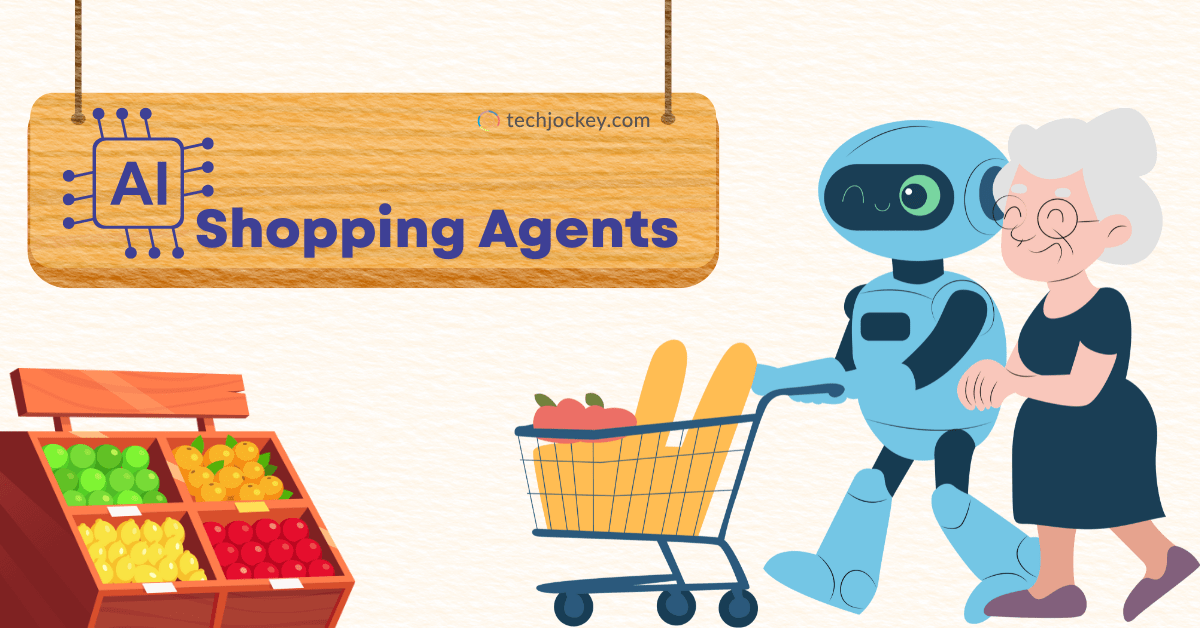
Online shopping has changed a lot lately, all thanks to advances in technology and the subsequent emergence of AI shopping agents. These virtual assistants, as the name suggests, offer personalized guidance and help customers find and buy products online, speeding up the shopping process.
It is thus owing to them that AI in shopping has become a key part of retail’s ongoing evolution. So, let’s explore these AI-powered shopping assistants in detail and while at it, highlight some leading options available today, because why not!
AI shopping agents are smart AI agent that help people shop online. Instead of scrolling through many product pages, users talk to these assistants. The agents look at past purchases, browsing habits, and interests to suggest the best products. They can also compare prices, find deals, and sometimes even complete the purchase.
This entire setup is called agentic commerce, where digital helpers act for you, but under your control, to make shopping easier for you. Their main goal is to save time and make online shopping smoother, whether you’re using an app, a website, or chatting with them.
While both AI-powered shopping assistants and chatbots use artificial intelligence, their roles in the online space differ sharply. Refer to the table given below to know how…
| Aspect | AI Shopping Agents | Chatbots |
|---|---|---|
| Primary Aim | Assist in selecting, comparing, and buying products | Provide customer service and answer queries |
| Personalization | Offers tailored suggestions based on data | Typically scripted, with limited personalization |
| Learning Capability | Continuously improves based on user input | Usually rule-based; minimal learning |
| Interaction Style | Conversational, dynamic, and recommendation-driven | Static or limited-script interactions |
| Key Example | Advising on product options and bundles | Providing order status, store hours |
Understanding the benefits helps explain why AI shopping agents are becoming popular with consumers and retailers alike…
AI shopping agents are reshaping e-commerce and taking it one step ahead in sundry ways. One of the leading ways in which it is doing so is by providing uninterrupted assistance, allowing shoppers to explore and buy products anytime, anywhere.
The way these agents constantly keep learning and refining their suggestions and offers with every interaction is another way they transform how people shop online. If that wasn’t enough, these also reduce lost sales and cart abandonment issues by consistently guiding users to complete purchases.
Another thing that these AI-powered shopping assistants simplify is inventory management. By keeping a close tab on people’s shopping patterns, these help retailers stock the right products, so they never run out of them and lose out on sales. This data also helps sellers market better as they get to personalize their ads and offers to suit individual preferences. This improves brand engagement in the long run.
AI shopping agents also enhance the e-commerce experience by continuously conversing with users, so they remain interested and involved throughout their shopping journey.
Even though AI shopping agents are powerful, they still face some problems. One big issue is privacy. These agents use personal data like shopping history and payment info, so strong security is needed to keep users’ trust.
Another problem is giving the right suggestions. If the data is wrong or missing, the AI might show bad product options. This can annoy users and make them trust the system less. Some people also prefer human advice for big purchases.
Building and running these agents costs a lot. It needs skilled people and money, which can be hard for small businesses. Also, making sure the agent works well on all devices is tricky and needs constant updates.
AI also struggles to understand complex or emotional choices. Some shopping needs depend on mood or special situations, which are hard for AI to get.
Finally, if people rely too much on AI, they might miss out on unique or different products. The system may limit their choices without them realizing it.
To get the most from AI shopping assistants, keep the following tips in mind…
Take a comparative glance at some of the leading AI-powered shopping agents available in the market to understand their workings better.
| AI-Powered Shopping Assistants | Features | Supported Platforms | Unique Strength |
|---|---|---|---|
| Amazon Assistant | Price tracking, deal alerts, personalized picks | Browser, Mobile app | Integrates deeply with Amazon’s inventory |
| ShopSavvy | Barcode scanning, instant price comparison | Mobile devices | Supports both online and in-store shopping |
| Fynd | Voice search, personalized recommendations | Mobile and Web | Extensive regional product catalogue |
| Findmine | Outfit creation, bundle offers | Web | Strong focus on fashion and lifestyle |
| CleverTap Bot | Chat-based purchase guidance, cart recovery | Messaging apps | Engaging shopping via chat interface |
Conclusion
The rise of AI shopping agents has made online shopping smarter and more personal. In fact, AI in online shopping offers exciting possibilities for both consumers seeking better shopping experiences and businesses looking for improved customer engagement.
Integrating these agents thus will be key for businesses to meet customer expectations in a world that’s becoming digital at the speed of light.
Pretexting is one such term in the field of cybersecurity that is quite abstract until… Read More
The ChatGPT caricature trend is the newest creative craze lighting up social media feeds. AI… Read More
Almost everyone must have once gotten message that looked like it came from a… Read More
Employee engagement has of late emerged as primary measure for seeing if a brand… Read More
HR operations may seem easily manageable on paper, but real experiences often tell different… Read More
Healthcare often feels complicated, slow, and scattered across many disconnected systems. Patients carry reports, repeat… Read More